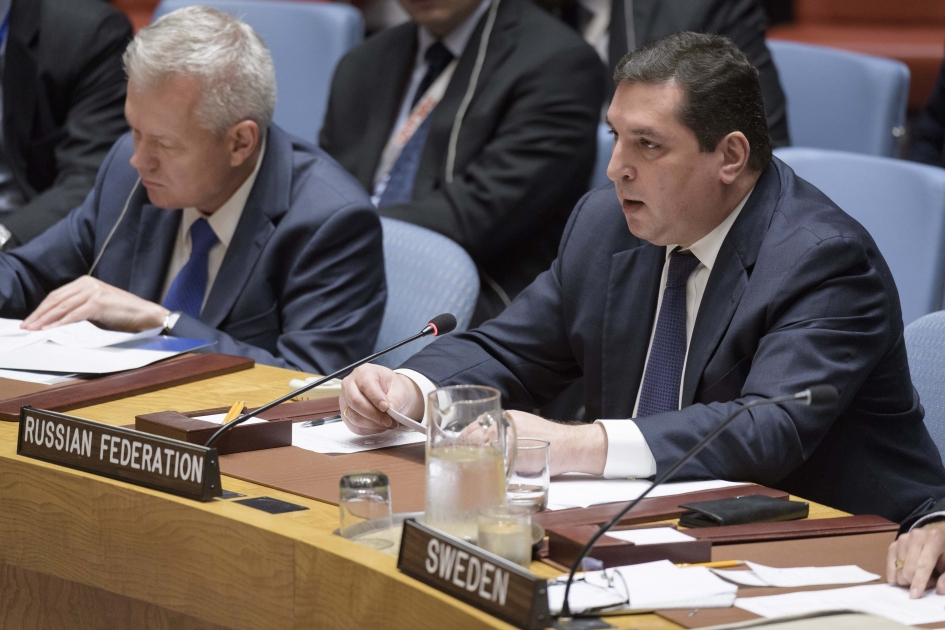Statement by Mr.Vladimir Safronkov, Chargé d'affaires, at the Security Council meeting on the situation in Yemen
We would like to thank you personally, Madam President, and the United Kingdom delegation for convening today’s meeting.
We are grateful to Mr. Griffiths, the Special Envoy of the SecretaryGeneral, for his comprehensive report on the efforts to bring the positions of the parties to the conflict in Yemen closer and work for a resumption of the negotiation process. We have great hopes for Mr. Griffiths’s ability to help the parties realize the futility and unviability of a military solution.
We thank Mr. Ging, Director of the Coordination and Response Division of the United Nations Office for the Coordination of Humanitarian Affairs for his briefing, which shows clearly that Yemen and its people are enduring a massive humanitarian disaster. We fully support the Special Envoy’s initiative to launch intra-Yemeni consultations in Geneva in September.
In our view it is desperately needed and represents a unique chance to end this bloody war. However, it will be important to ensure that as we get closer to the negotiations, every key stakeholder is available to help the parties find common denominators. In our view, maintaining a calm atmosphere around Al-Hudaydah and refraining from offensive action would facilitate the implementation of this initiative. Everyone must show restraint and reject any resort to force.
We agree with the Special Envoy that what is needed is de-escalation and measures to build trust, including freeing prisoners and detainees. We would add that we need to unite the efforts of every Yemen in combating terrorism on the Arabian Peninsula. We should point out that from the very beginning of the military operation we have emphasized that Al-Hudaydah port, and Yemen’s other ports, must be able to function reliably, since there are no alternative routes into the country for a steady and uninterrupted flow of humanitarian and commercial cargoes. Restraint is all the more essential in view of the fact that two thirds of the people of Yemen are in need of help. The civilian infrastructure lies in ruins and the country is facing a new cholera epidemic. In that regard, it will be vital to continue the humanitarian efforts.
We have noted the courageous work being done by United Nations humanitarian personnel, as well as the independent contributions of a number of Member States, including Yemen’s nearest neighbours. Russia has also been providing assistance to the people of Yemen through both Sana’a and Aden. But it is obvious to all of us that humanitarian efforts are not enough to bring the conflict to an end, and neither is military action. We all agree that there can be no military solution to the crisis in Yemen. It is essential that we shift the focus on the current situation to a political dialogue.
The Special Envoy has a key role to play in this, and we support his efforts, including through practical efforts with the parties aimed at getting them to cooperate closely with the United Nations. It is important that he work in Yemen in person, maintaining a direct dialogue with all the main Yemeni and regional players. The potential for collective international assistance to the Special Envoy’s efforts is far from being fully utilized, in our opinion, and we still need to come up with a capable, balanced and focused format for supporting efforts through the United Nations, which — and this is crucial — will act on a consolidated basis.
We would like to emphasize that establishing a political process in Yemen would be an important contribution to stabilizing the situation throughout the subregion. We would like to recall our proposal for launching a process for developing a package of security and confidence-building measures in the Persian Gulf and eventually the entire Middle East. This type of structure, in which every key country of the region should participate — including the Gulf States and Iran — could not only help to strengthen universal, comprehensive and undivided security in that part of the world but also resolve long-standing and new crisis situations, including the conflict in Yemen.
Threats and clashes must give way to dialogue and cooperation. We must get to work right away on joint efforts to restore a healthier atmosphere, which incidentally would make a tremendous contribution to helping Mr. Griffiths succeed. Russia will continue to consult with all interested parties with the aim of implementing our concept of security and cooperation in the Persian Gulf, which we believe is urgent and essential.
In conclusion, we urge all the parties involved in the conflict in Yemen to take advantage of the opportunity offered by Mr. Griffiths’s proposal to organize negotiations in Geneva in early September, the success of which will be facilitated by a rejection of military action and a willingness to work for a political settlement. And the only priority should be a concern for the interests of the people of Yemen.
